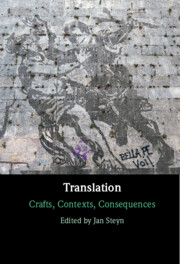Book contents
- Translation
- Translation
- Copyright page
- Dedication
- Contents
- Figures
- Contributors
- Acknowledgements
- Introduction
- Chapter 1 Solitude of the Translator
- Chapter 2 Translation, Creativity, Awareness
- Chapter 3 Anatomy of a Day in the Life of a Translator
- Chapter 4 Sturm, Drang and Slang
- Chapter 5 On X
- Chapter 6 Translating the Greeks
- Chapter 7 Beyond Faithfulness
- Chapter 8 Translation in and of Psychoanalysis
- Chapter 9 Translation across Brains and across Time
- Chapter 10 Covalent Effect
- Chapter 11 Notes on the Translator’s Space/The Editor’s Place
- Chapter 12 The State of Things
- Chapter 13 Translating into a Minor Language
- Chapter 14 An Other Language
- Chapter 15 Five Entries on Translation and Loss
- Chapter 16 ‘A Kind of Radical Positivity’
- Bibliography
- Index
Chapter 2 - Translation, Creativity, Awareness
Published online by Cambridge University Press: 23 September 2022
- Translation
- Translation
- Copyright page
- Dedication
- Contents
- Figures
- Contributors
- Acknowledgements
- Introduction
- Chapter 1 Solitude of the Translator
- Chapter 2 Translation, Creativity, Awareness
- Chapter 3 Anatomy of a Day in the Life of a Translator
- Chapter 4 Sturm, Drang and Slang
- Chapter 5 On X
- Chapter 6 Translating the Greeks
- Chapter 7 Beyond Faithfulness
- Chapter 8 Translation in and of Psychoanalysis
- Chapter 9 Translation across Brains and across Time
- Chapter 10 Covalent Effect
- Chapter 11 Notes on the Translator’s Space/The Editor’s Place
- Chapter 12 The State of Things
- Chapter 13 Translating into a Minor Language
- Chapter 14 An Other Language
- Chapter 15 Five Entries on Translation and Loss
- Chapter 16 ‘A Kind of Radical Positivity’
- Bibliography
- Index
Summary
The analysis and translation of extreme texts, or highly constrained texts, such as acronyms, anagrams, lipograms, pangrams, plays on words, and puns but also poems, lyrics, and even novels, are not just useful teaching practices that can allow students to improve their linguistic competence, both in their native and foreign languages. These activities have a fundamental pedagogical and political value. In training translators, ‘talk-and-chalk’ lectures should be replaced by collaborative workshops, attended not only by teachers and students but also by experts and actors in the editorial productive chain (professional translators, editors, publishers, and clients).
Keywords
- Type
- Chapter
- Information
- TranslationCrafts, Contexts, Consequences, pp. 15 - 31Publisher: Cambridge University PressPrint publication year: 2022

